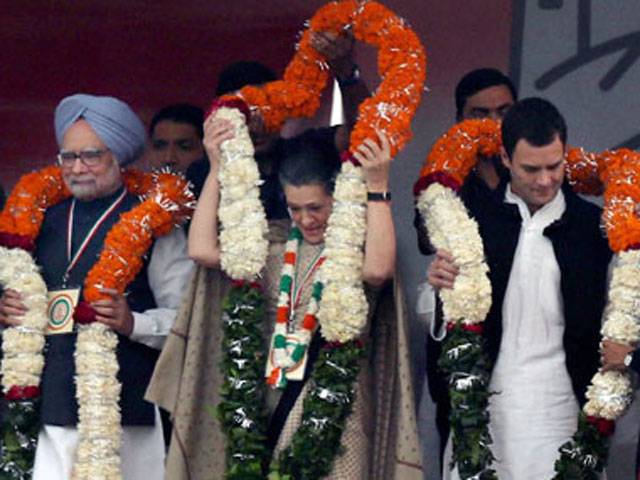NEW DELHI : Anger at corruption and despondency over the economy could see support for India’s ruling Congress party hit an all-time low at next month’s general elections, newspapers said Thursday.
The day after the election commission announced the world’s largest democracy would go to the polls from April 7, there was a consensus that the centre-left Congress’s 10-year rule was drawing to a close.
While no one party is expected to win an outright majority in the 543-seat Lok Sabha, the right-wing Hindu nationalist Bharatiya Janata Party (BJP) is widely forecast to unseat the country’s traditional governing party after the results are announced on May 16.
Dubbing the election “The Greatest Show On Earth”, the Times of India said anger over the Congress-led coalition’s “scandal-ridden, paralytic second term” of government would see it shed votes to the BJP, regional rivals, and an upstart anti-corruption party.
“There is a danger that Congress may lose to both BJP and regional rivals and end up with a record low total,” said the paper.
The Hindustan Times said history showed voters were increasingly turning to smaller parties, pointing to the 1996 polls when they collectively won the greatest shares of votes.
“This trend persisted, and in 2004, state parties on their own outweighed the Congress and BJP in terms of popular support. This is testament to the increasing plurality and ‘regionalisation’ of politics.”
The Hindu, a left-leaning daily, identified “corruption and governance as major issues” in the election, which will take place in nine phases over five weeks.
Outgoing Prime Minister Manmohan Singh has presided over a series of graft scandals, particularly since his re-election in 2009, and growth has slowed to its lowest level in a decade.
The BJP’s choice for prime minister, Gujarat Chief Minister Narendra Modi, has been campaigning on a platform of economic revival, with polls indicating deep-seated disillusionment about the state of the nation.
“Unmistakably, the coalition, with many of the allies pulling in different directions, and some of the ministers caught in corruption cases, has come to be seen as weak and ineffectual,” said The Hindu.
The Hindustan Times published a poll predicting the BJP and its allies would win up to 70 of the 120 seats up for grabs in the key battleground states of Uttar Pradesh and Bihar.
The Indian Express columnist D.K. Singh said there was “increasing despair in the ruling camp” and said there was a feeling within Congress that its election frontman Rahul Gandhi already knew the game was up and instead “has his sights set on 2019” when the next elections are due.
While his father, grandmother and great-grandfather were all prime minister, Gandhi has never held public office and commentators have frequently questioned his desire to follow in their footsteps.
In contrast, The Times of India said Modi had proved himself “an energetic campaigner who is drawing large crowds” and strong poll ratings.
But the paper identified the legacy of the 2002 communal riots in Gujarat, when more than 1,000 mainly Muslim residents were killed, as his main “weak spot” that could not only alienate voters but also make it harder to forge an alliance with minority parties after May 16.
In his favour, Gandhi had a “lower ‘acceptance threshold’” which could in theory enable him to build a coalition even if his Congress wins less seats than the BJP.
Friday, April 19, 2024
Congress faces ‘record low’ in India election

Caption: Congress faces ‘record low’ in India election
Raja Basharat, Tahir Sadiq & others granted bail
April 19, 2024
Entrepreneurship curriculum introduced in FDE schools
April 19, 2024
Rawalpindi Food Dept opens wheat procurement applications
April 19, 2024
Naan Bais continue strike over Roti pricing
April 19, 2024
Hepatitis Challenge
April 18, 2024
IMF Predictions
April 18, 2024
Wheat War
April 18, 2024
Rail Revival
April 17, 2024
Addressing Climate Change
April 17, 2024
Justice denied
April 18, 2024
AI dilemmas unveiled
April 18, 2024
Tax tangle
April 18, 2024
Workforce inequality
April 17, 2024
New partnerships
April 17, 2024
ePaper - Nawaiwaqt
Advertisement
Nawaiwaqt Group | Copyright © 2024





